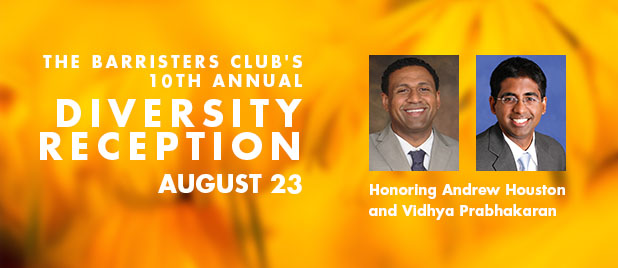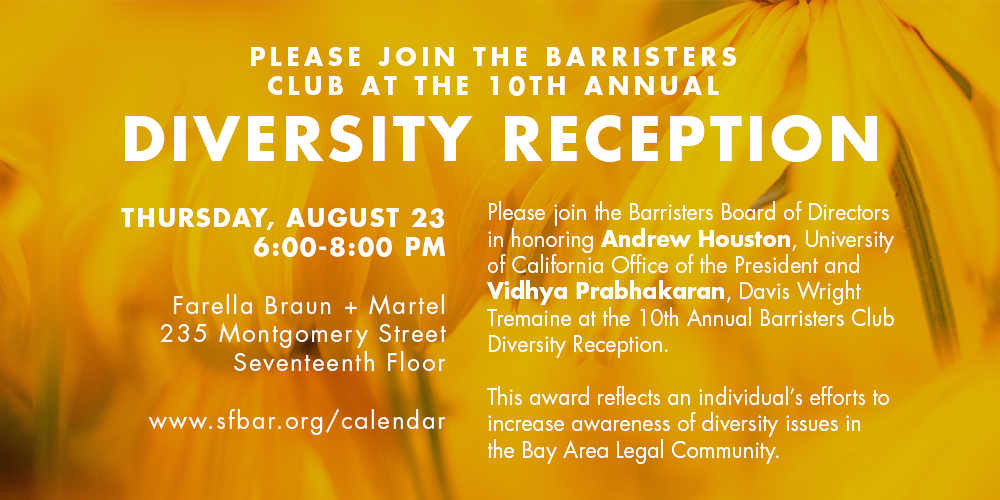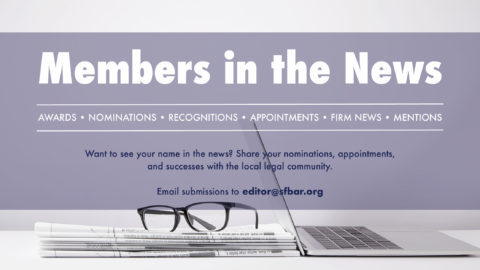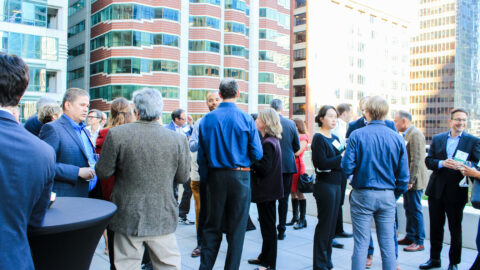This year marks the tenth anniversary of the Barristers Club’s annual Diversity Reception. Each year, two individuals are honored for their outstanding efforts to increase awareness of diversity issues in the Bay Area legal community.
Below are excerpts from interviews with the two 2018 recipients: Andrew Houston, University of California Office of the President, and Vidhya Prabhakaran, Davis Wright Tremaine.
Recipients will be honored on August 23 at the Barristers Club’s 10th Annual Diversity Reception. The reception is held at Farella Braun + Martel and begins at 6:00 p.m. For more information, please visit www.sfbar.org/calendar.
Tell us about some of the ways you’ve been active and involved in promoting diversity in the profession?
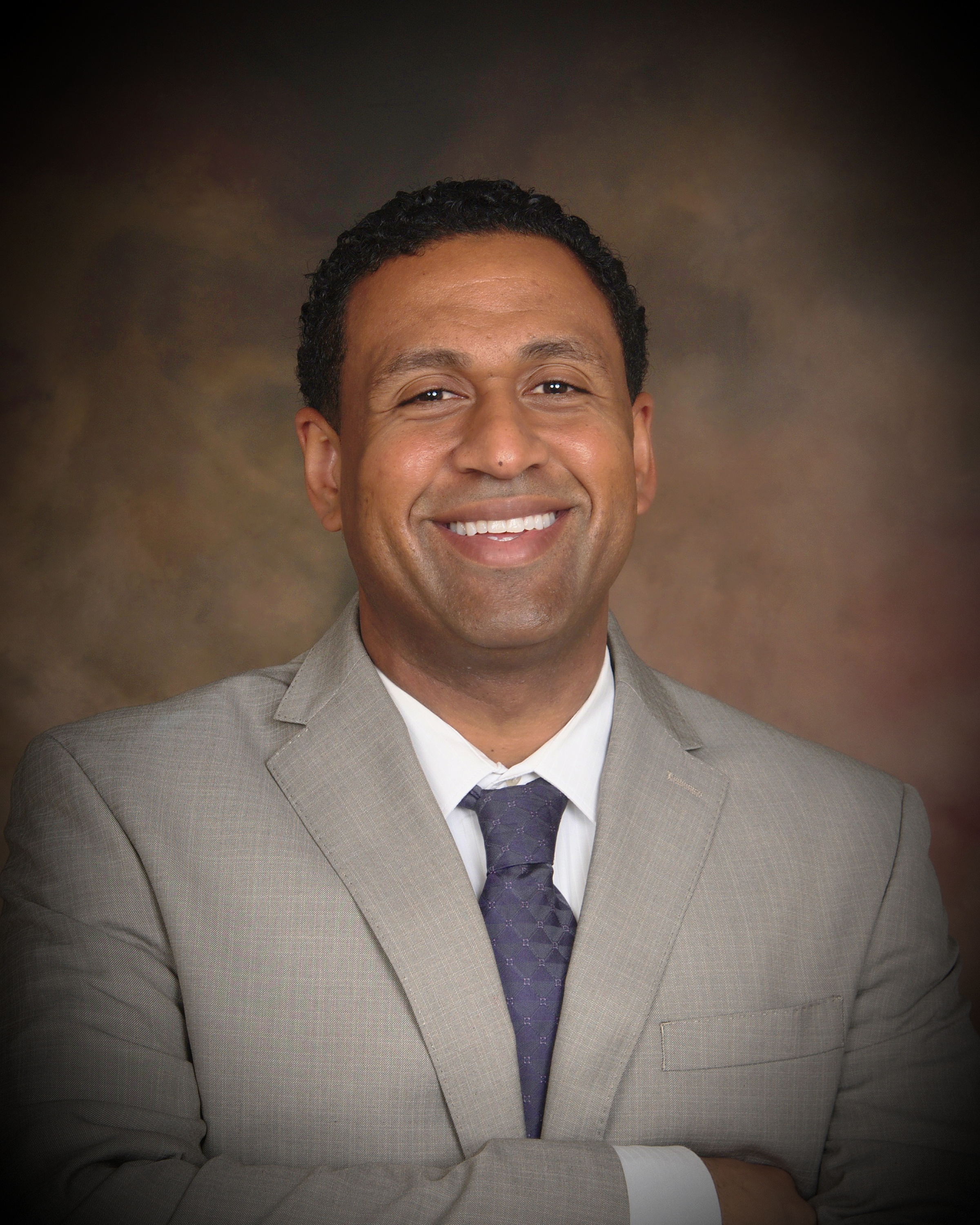
Andrew Houston (AH): As the 2016 and 2017 Charles Houston Bar Association (CHBA) President, I was active in starting the Annual Arc of Justice Summer Fellowship. Awarded to law students who are committed to advancing the legal and policy priorities of low-income African American communities in the Bay Area, the fellowship is collaboration between Public Advocates and CHBA to help increase the number of law students of color who pursue careers in public interest law. The Arc of Justice fellow spends their summer clerking at Public Advocates on the Metropolitan Equity Team, with dedicated support from CHBA.
Also as CHBA President, CHBA teamed with the California Bar Foundation (CBF) on the 3L Diversity Scholarship. We know Bar Exam-related costs as well as living expenses while studying for the exam can add thousands of dollars to a law school graduate’s debt burden. Each spring CHBA and CBF, provided cash awards as well as a free bar prep course to recent and soon-to-be African-American law school graduates who plan to take the California bar exam.
Diversity includes a broad array of backgrounds and life experiences, including students from groups or with skills or attributes that are underrepresented in the legal profession, and specifically including students from socially and economically disadvantaged backgrounds.
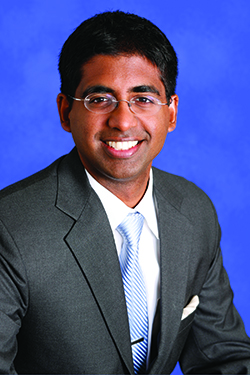
Vidhya Prabhakaran (VP): I was part of the Bar Association of San Francisco’s Equality Committee, with Quyen Ta, Paul Henderson and Miriam Montesinos where the focus is to ensure equality in the profession. Our work is focused on developing goals and timetables for the legal profession with respect to diversity and providing practical tips on how to take advantage of the opportunities that do exist as a result of being a diverse attorney, and deal with the challenges that come with being diverse.
The other main way is being actively involved with a number of other bar associations, including being a former president of the South Asian Bar Association of Northern California and co-chair of the Minority Bar Coalition of Northern California. Those experiences helped shape my perspective on the importance of having a space for diverse lawyers to advance their careers, being a sounding board for diversity-related issues, and promoting best practices.
What’s driven you to be so focused on forwarding diversity in the profession?
AH: Being a first-generation college student means that I was first person in my immediate family to attend college. Being a first-generation college student represents progress for my family. Being able to graduate from college and law school represented hope for my family, and it was a guide for family members in younger generations.
With that said, diversity in the profession is personal for me. As I’ve risen up the ladder I’ve always had the goal of inspiring those other student of color who are first-generation to keep going and attend college. Sometimes first-generation students quit before completing their degree, partially because they don’t have an example to show them how to deal with the stress or expectations.
VP: Many of us became lawyers with the ideal that lawyers have the ability to impact the broader community. Growing up I didn’t know any attorneys, I don’t have any lawyers in my family, and when I did become a lawyer it was amazing to me how quickly people would reach out in our South Asian community with their problems, and it made me happy to be able to help. I quickly realized that the only way those efforts were going to trickle into the broader community was if we have enough diverse attorneys to offer this counseling. I realized the only way we can impact minority communities is to have people who are trained to help. Advancing diverse attorneys and spreading the word throughout our community is the best way to have that impact.
What steps do you think our profession could take to keep promoting diversity?
AH: I think law schools needs to connect with their alumni to create new outreach and diversity programs that will support a pipeline to recruit, enroll, and financially support diverse students.
VP: Most of the legal community has publicly made the commitment that diversity is important, and have adopted it as a core value and that’s great. The next step is to have a laser focus on numbers and data and to actually track it, and it goes beyond the snapshot statistics that we take on a year to year basis. We need to look at hiring rates, attrition rates and be comfortable with the idea that they might not look good now but if we focus on it it’ll get better.
Anything else you want to say about this movement in general?
AH: I’m a firm believer in the idea that every person can make a unique and positive contribution to the larger society because of, rather than in spite of, their diversity. Wherever I go I try to create an environment where diversity is recognized and respected; various cultural ideas are acknowledged and valued; contributions from all groups are encouraged; people are empowered to achieve their full potential; and differences are celebrated.
VP: I’ve been thinking about this a lot recently. Because we have joined law firms and in house departments that get it in terms of what diversity means for the firm, what’s the secret or magic to taking it to the next step? It’s for the diverse attorneys who are in those companies to take advantage of those opportunities. It may mean that you have an opportunity to advance into management, or take on a pro bono case, or hire someone who is diverse where previously those opportunities may not have existed. The question is: Will you take the opportunity? The challenge to me and my colleagues is that we have to take the risk to let the ladder down for the next generation. You may fail or mess up on a pro bono case or may find that you make a poor decision, but in the grand scheme of things you’ll be creating opportunities for others and be a role model and we need to take that responsibility seriously.
________________________________________________________
Recipients will be honored on August 23 at the Barristers Club’s 10th Annual Diversity Reception. The reception is held at Farella Braun + Martel and begins at 6:00 p.m. For more information, please visit www.sfbar.org/calendar.


